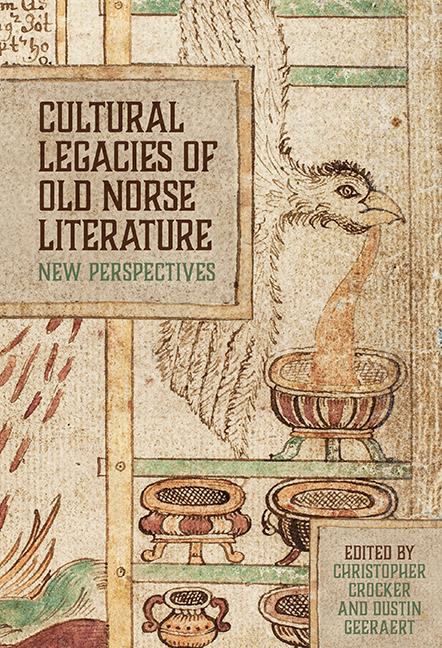Book contents
- Frontmatter
- Contents
- List of Illustrations
- List of Contributors
- Foreword: Old Norse and the Porous Boundaries of Medievalism
- Acknowledgements
- Note on the Text
- Introduction
- 1 Dr Jekyll and Mr Hyde in Medieval Iceland: Saga Realism and the Sworn Brothers
- 2 The Malleability of the Past: Íslendingabók as Narrative History
- 3 Women’s Work and Material Culture in Medieval Iceland: Gender, Narrative, and Cloth Production
- 4 Vafþrúðnismál, from Parchment to Print: Stability and Change in the Transmission of Eddic Poetry
- 5 The Odinic Motif: The Wanderer in the Mist
- 6 What has Darwin to do with Óðinn? Shapeshifting, God, and Nature in the ‘Great Story of the North’
- 7 Madness, Mythology, and Mitteleuropa: Günter Grass’s Transformation of Old Norse Myth in The Tin Drum
- 8 Once More, with Fiction: Transforming Myth in Gerður Kristný’s Blóðhófnir and the Eddic Poem Skírnismál
- Afterword: Ethnographic Medievalisms
- Bibliography
- Index
7 - Madness, Mythology, and Mitteleuropa: Günter Grass’s Transformation of Old Norse Myth in The Tin Drum
Published online by Cambridge University Press: 08 October 2022
- Frontmatter
- Contents
- List of Illustrations
- List of Contributors
- Foreword: Old Norse and the Porous Boundaries of Medievalism
- Acknowledgements
- Note on the Text
- Introduction
- 1 Dr Jekyll and Mr Hyde in Medieval Iceland: Saga Realism and the Sworn Brothers
- 2 The Malleability of the Past: Íslendingabók as Narrative History
- 3 Women’s Work and Material Culture in Medieval Iceland: Gender, Narrative, and Cloth Production
- 4 Vafþrúðnismál, from Parchment to Print: Stability and Change in the Transmission of Eddic Poetry
- 5 The Odinic Motif: The Wanderer in the Mist
- 6 What has Darwin to do with Óðinn? Shapeshifting, God, and Nature in the ‘Great Story of the North’
- 7 Madness, Mythology, and Mitteleuropa: Günter Grass’s Transformation of Old Norse Myth in The Tin Drum
- 8 Once More, with Fiction: Transforming Myth in Gerður Kristný’s Blóðhófnir and the Eddic Poem Skírnismál
- Afterword: Ethnographic Medievalisms
- Bibliography
- Index
Summary
The German writer Günter Grass (1927–2015) is perhaps still most celebrated for his novel Die Blechtrommel (The Tin Drum), published in 1959, and first translated into English two years later. The Tin Drum is set largely in Gdansk, in a period of the twentieth century roughly corresponding to Grass's own life from his birth to the novel's publication. It has been rec-ognized as a work in the so-called magic realist genre, in which a realistic setting is combined with openly fantastical elements. The Grass scholar Peter Arnds has argued, with particular reference to The Tin Drum, that magic realist novels generally draw on mythic materials, but in fact, he adduces very few actual mythic allusions in his analysis of The Tin Drum. In what follows, I will show that Günter Grass drew heavily and persistently on Old Norse mythology in his creation of what many regard as one of the great European historical novels of the twentieth century.
The Tin Drum and History
Oskar Matzerath, the protagonist of The Tin Drum, announces his status in the very first sentence of the novel as an inmate of a mental hospital. We are thus primed to engage with an unreliable narrator, as indeed Oskar proves to be. He recounts the circumstances of his own conception and birth in 1924, at which he is a precocious and sardonic witness and commentator. His alleged neonatal impressions are hearing his mother's promise that he will be given a toy drum on his third birthday, and the oddly confirmatory drumming noise a moth is making as it flutters wildly against a lightbulb above his mother's bed. He is indeed given a drum for his third birthday. But the same day, he tells us, he flings himself through an open trapdoor down into the cellar of the family grocery shop – a horrific childhood accident which our unreliable narrator Oskar represents as a deliberate and carefully considered act. He ascribes his subsequent failure to grow as a conscious exercise of his own will. On the day he ends his growth, he begins his career as a drummer. He is a dwarf with a drum
- Type
- Chapter
- Information
- Cultural Legacies of Old Norse LiteratureNew Perspectives, pp. 141 - 160Publisher: Boydell & BrewerPrint publication year: 2022



